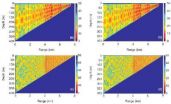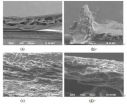Consumerism and its antisocial effects can be turned on -- or off
2012-04-10
(Press-News.org) Money doesn't buy happiness. Neither does materialism: Research shows that people who place a high value on wealth, status, and stuff are more depressed and anxious and less sociable than those who do not. Now new research shows that materialism is not just a personal problem. It's also environmental. "We found that irrespective of personality, in situations that activate a consumer mindset, people show the same sorts of problematic patterns in wellbeing, including negative affect and social disengagement," says Northwestern University psychologist Galen V. Bodenhausen. The study, conducted with colleagues Monika A. Bauer, James E. B. Wilkie, and Jung K. Kim, appears in Psychological Science, a journal of the Association for Psychological Science.
In two of four experiments, university students were put in a materialistic frame of mind by tasks that exposed them to images of luxury goods or words mobilizing consumerist values (versus neutral scenes devoid of consumer products or words without such connotations). Completing questionnaires afterwards, those who looked at the pictures of cars, electronics, and jewelry rated themselves higher in depression and anxiety, less interested in social activities like parties, and more in solitary pursuits than the others. Those primed to materialism by exposure to certain words evinced more competitiveness and less desire to invest their time in pro-social activities like working for a good cause.
In two other experiments, participants completed tasks that were framed as surveys—one of consumer responses, another of citizens.' The first experiment involved moving words toward or away from the participant's name on a computer screen—positive and negative emotion words and "neutral" ones that actually suggested materialism (wealth, power), self-restraint (humble, discipline), transcendence of self, or self-indulgence. The people who answered the "consumer response survey" more quickly "approached" the words that reflected materialistic values than those in the "citizen" survey. The last experiment presented participants with a hypothetical water shortage in a well shared by four people, including themselves. The water users were identified either as consumers or individuals. Might the collective identity as consumers—as opposed to the individual role—supersede the selfishness ordinarily stimulated by the consumer identity? No: The "consumers" rated themselves as less trusting of others to conserve water, less personally responsible and less in partnership with the others in dealing with the crisis. The consumer status, the authors concluded "did not unite; it divided."
The findings have both social and personal implications, says Bodenhausen. "It's become commonplace to use consumer as a generic term for people," in the news or discussions of taxes, politics, or health care. If we use term such as Americans or citizens instead, he says, "that subtle difference activates different psychological concerns." We can also take personal initiative to reduce the depressive, isolating effects of a materialist mindset by avoiding its stimulants—most obviously, advertising. One method: "Watch less TV."
INFORMATION:
For more information about this study, please contact: Galen V. Bodenhausen at galen@northwestern.edu.
The APS journal Psychological Science is the highest ranked empirical journal in psychology. For a copy of the article "Cuing Consumerism: Situational Materialism Undermines Personal and Social Well-Being" and access to other Psychological Science research findings, please contact Lucy Hyde at 202-293-9300 or lhyde@psychologicalscience.org.
END
ELSE PRESS RELEASES FROM THIS DATE:
2012-04-10
A new analysis provides a closer look at how much cancer patients value hope — with important implications for how insurers value treatment, particularly in end-of-life care.
The analysis led by Darius Lakdawalla, director of research at the Schaeffer Center at USC and associate professor in the USC Price School of Public Policy, surveyed 150 cancer patients currently undergoing treatment, and is part of a special issue on cancer spending from the journal Health Affairs.
Lakdawalla and his co-authors found the overwhelming majority of cancer patients prefer riskier ...
2012-04-10
In the face of mass deforestation of the Amazon, recent findings indicate that we could learn from its earliest inhabitants who managed their farmland sustainably. An international team of archaeologists and paleoecologists, including Dr. Mitchell Power, curator of the Garrett Herbarium at the Natural History Museum of Utah and assistant professor in the Department of Geography at the University of Utah, report for the first time that indigenous people, living in the savannas around the Amazonian forest, farmed without using fire. These findings are published today, April ...
2012-04-10
BOSTON – Contrary to popular perception, a large proportion of obese Americans can and do lose weight, say researchers at Beth Israel Deaconess Medical Center. What's more, they say, the old tried and true methods of eating less fat and exercising are some of the most effective paths to weight loss success.
The research results appear in the April 10 online issue of the American Journal of Preventive Medicine.
"This is great news because studies have shown that even a 5 percent reduction in weight can lead to improved health," says lead author Jacinda M. Nicklas, MD, ...
2012-04-10
San Diego, CA, April 10, 2012 – A third of Americans are now obese, and up to 70% of them are trying to lose weight. In a new study published in the American Journal of Preventive Medicine, researchers from Harvard Medical School and Beth Israel Deaconess Medical Center in Boston have found in a nationally representative sample that obese dieters who said they ate less fat, exercised more, and used prescription weight loss medications were more likely to lose weight. Diet foods and products, nonprescription diet pills, and popular diets were less successful, according ...
2012-04-10
People who received frequent dental x-rays in the past have an increased risk of developing the most commonly diagnosed primary brain tumor in the United States. That is the finding of a study published early online in Cancer, a peer-reviewed journal of the American Cancer Society. Although dental x-rays are necessary in many cases, these findings suggest that moderate use of this form of imaging may be of benefit to some patients.
Ionizing radiation is the primary environmental risk factor for developing meningioma, which is the most frequently diagnosed primary brain ...
2012-04-10
The coupled normal mode method is a powerful approach for solving range-dependent propagation problems in underwater acoustics. An important area of study is to improve stability and efficiency so as to be able to deal with complex scenarios in a realistic environment. Professor LUO Wenyu and his group from the State Key Laboratory of Acoustics, Institute of Acoustics, Chinese Academy of Sciences, set out to tackle this problem. After several years of innovative research, they have developed an accurate, efficient, and numerically stable coupled normal mode method to solve ...
2012-04-10
The Pharmaceutical Education and Research Institute (PERI) and PeerParty are pleased to announce the inaugural CME National Championship for the healthcare community. The Championship introduces a new approach to continuing education for healthcare practitioners - a fun, collaborative approach that rewards participants for learning and building their professional networks. This innovative approach employs a number of new techniques to challenge and reward participants, with the goal of positively affecting knowledge-sharing, learning and most importantly, improving patient ...
2012-04-10
The bio-mechanisms of the woodpecker's resistance to head impact injury are an interesting scientific question. Professor FAN Yubo and his group from the Key Laboratory for Biomechanics and Mechanobiology of the Ministry of Education, School of Biological Science and Medical Engineering, Beihang University, and the School of Materials Science and Engineering, Wuhan University of Technology, set out to study this problem. After 3 years of innovative research, they are making progress in uncovering the explanation for the avoidance of head impact injury by woodpeckers. Their ...
2012-04-10
San Diego, CA, April 10, 2012 – The neighborhoods in which children and adolescents live and spend their time play a role in whether or not they eat a healthy diet, get enough exercise or become obese, concludes a collection of studies in a special theme issue of the American Journal of Preventive Medicine.
Each of the six studies uses the latest concepts and methods in geographic information systems (GIS)-based research to determine how the geographic location affects physical health. A study titled "Spatial Classification of Youth Physical Activity Patterns" shows, ...
2012-04-10
Psoriasis is a non-contagious, genetic disease of the immune system and manifests itself in the skin and/or joints of the body. It affects about 2% of the population or 7,500,000 people in the United States alone. Research is the top priority of The National Psoriasis Foundation, whose efforts are aimed at searching for better treatments and a cure for psoriasis.
"The National Psoriasis Foundation appreciates the dedication of our corporate partners who so willingly support our mission goal of research for a cure," says Eric Kimble, a Board of Trustee of the ...
LAST 30 PRESS RELEASES:
[Press-News.org] Consumerism and its antisocial effects can be turned on -- or off



